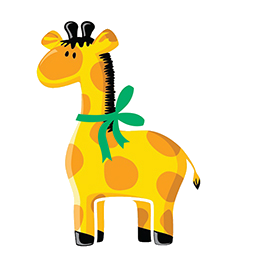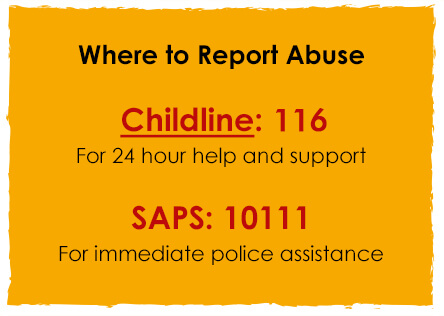Report Abuse
Every person has a legal obligation to report on any child physical abuse,
sexual abuse and neglect they see or experience.
Call one of the numbers below if you suspect or experience any abuse.
You may also directly contact the Family Violence, Sexual Exploitation and Child Protection (FCS) Units
Child Protection Units deliver services which are sensitive to the child victim. FCS Units expanded on the services provided for children to include adult victims of family violence and sexual offences. These centres are a valuable resource for gaining more information about abuse, local referrals or for reporting abuse.
Jerry Giraffe helps keep children safe!
Developed by Think Twice, a Connect Network affiliate, the Jerry Giraffe programme teaches children the importance of making positive choices, body pride and ownership and how to develop child abuse awareness and safety skills.
He becomes a confidant and safe ‘person’ to share secrets with as well as a symbol of those adults who are there to help.

The Duty to Report Child Abuse
There are two laws which cover child physical/sexual abuse and neglect. Section 15 of the Child Care Amendment Act says that any person who has anything to do with caring for children — for example teachers, social workers, and doctors — and who suspects that a child has been abused, must report this to the provincial Department of Social Development. The Prevention of Family Violence Act No 133 of 1993 (Section 4) says that suspected child abuse must be reported to a police officer or a child welfare officer or social worker.
Section 110 of the Children’s Act compels the following people to report incidents of child abuse and neglect:
“Any correctional official, dentist, homeopath, immigration official, labour inspector, legal practitioner, medical practitioner, midwife, minister of religion, nurse, occupational therapist, physiotherapist, psychologist, religious leader, social service professional, social worker, speech therapist, teacher, traditional health practitioner, traditional leader or member of staff or volunteer worker at a partial care facility, drop-in centre or child and youth care centre.”
What must be Reported? / Compulsory Reporting
If you are one of the people listed in section 110 of the Children’s Act you must report:
- Physical abuse causing injury
- Sexual abuse
- Deliberate child neglect
When should you make a report?
Any official report must be based on the conclusion that abuse or neglect occurred, and not on mere speculation. However, don’t ignore suspicions. Instead, if you suspect abuse or neglect, then look to the guiding Regulations of the Act that can help you conclude whether or not a child has been abused or neglected as defined by set indicators. In deciding whether a child has been abused or neglected, the Act requires that these signs or indicators be considered in the “total context of the child’s situation”. This means that the focus should not fall on only one factor or indicator alone.
Who do you report to?
Once a conclusion is reached that there was/is abuse or deliberate neglect, it must be reported to one of three authorities: a designated child protection organisation, the provincial Department of Social Development or a police official.
What does the reporting entail?
When reporting a case of abuse or neglect to an appropriate authority, ensure that Form 22 is completed. This form triggers a child protection investigation by a designated social worker.
What is voluntary reporting?
The compulsory reporting obligation applies only to sexual abuse, physical abuse causing injury, and deliberate neglect. However, there are many other circumstances that may leave a child in need of care and protection. In these cases anyone can make a voluntary report. The full list in section 150 (1) of the Act provides that a child is considered to be in need of care and protection if, for example, the child:
- Has been abandoned or orphaned and without visible means of support;
- Lives or works on the street or begs for a living;
- Is addicted to a substance and without support to obtain treatment;
- Lives in or is exposed to circumstances which may seriously harm his physical, mental or social well-being;
- Is in a state of physical or mental neglect (see the full list for more examples).
If you find a child in any of these circumstances you can make a voluntary report to the appropriate authority. Complete Form 22; submit it to a designated child protection organisation or official, and a social worker will be assigned to do an investigation into the circumstances of the case.
What about a child’s privacy and confidentiality?
Should a child’s right to protection from abuse or neglect override his or her right to privacy and confidentiality? The simple answer is yes. Children’s rights cannot be understood in terms of a hierarchy of importance — they are all inter-dependent. The realisation of one right often involves the simultaneous realisation of another but at times there can be tension between the achievement of different rights.
The legal obligation to report cases of abuse and neglect to the appropriate authorities is always overarching, even where the child doesn’t want to pursue the case further. In such circumstances, it is important to clearly explain to the child the boundaries of confidentiality, and to involve them in decisions about how and when the information will be reported. Delicately explain the reasons for overriding the child’s wishes, and keep the child fully informed throughout the process.
Remember, violence and abuse of children serves to disempower them. It is therefore vital that the strategies adopted to protect them should not be further disempowering.
Should you report consensual sex between adolescents?
No, professionals do not have to report consensual sexual acts between adolescents (children between the ages of 12 and 15). However, it is an offence for a person older than 16 years to have sex with an adolescent child, and any form of sexual abuse must be reported.
Sexual experimentation by adolescents is a normal part of growing up. However, adolescents’ health and wellbeing may be at risk if they engage in sexual activity without the necessary knowledge about contraception, STIs and HIV, or before they are mature enough to understand and handle the emotional and health consequences. It is in the best interests of children to minimise these risks by not engaging in sexual activity.
In 2007, the Criminal Law Sexual Offences Act was amended, making it an offence for children aged 12 to 15 to engage in consensual sexual acts (ranging from kissing to penetration). The Act obliges anyone who knows of such a sexual offence to report it to the police – even if those involved are consenting adolescents. However, civil society organisations successfully challenged this amendment in the constitutional court. The court found that “the reporting provisions are likely to create an atmosphere in which adolescents will not freely communicate about sexual relations with parents and counsellors[1]” and essentially decriminalised such actions. Moreover, the court stated that it is important to ensure that “children are appropriately supported by the adults in their lives, to enable them to make healthy choices. … If children are not made to feel that there are safe environments within which they can discuss their sexual experiences, they will be stripped of the benefit of guidance at a sensitive and developmental stage of their lives”.
[1] Teddy Bear Clinic for Abused Children and RAPCAN v Minister of Justice and Constitutional Development and Another CCT 12/13 [2013] ZACC 35, para 73.


